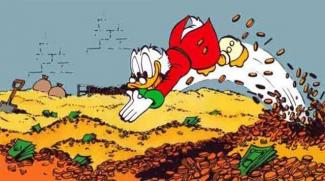PANDEMIC PLUMBS
Executives re-jig rules to keep their big money rolling in

THE PANDEMIC WAS NO MATCH FOR OUR CEOS. They managed to keep paying themselves fat bonuses to increase their annual income by an average of $171,000 (17 per cent) compared to 2019—even when their businesses and workers took heavy hits.
Senior economist David Macdonald, and co-author Alicia Masse, detail exactly how the executives gamed their own systems to keep their money rolling in in “Boundless Bonuses: Skyrocketing Canadian executive pay during the 2020 pandemic”, an August 17 in-depth analysis from the left-wing think tank the CCPA (Canadian Centre for Policy Alternatives).
CEO pay goes up no matter what
“It’s almost impossible for execs not to get bonuses,” says Macdonald. “It’s always heads, I win—tails, I change the rules.”
The CCPA analysis found that 49 publicly traded Canadian companies changed compensation rules to boost executive bonuses, even if their companies underperformed due to the pandemic.
The report also found that more than half of the executives who agreed to take a COVID-19 salary cut saw their total pay in 2020 actually go up, thanks again to generous bonuses.
The CCPA tracked the compensation of 1,096 executives using filings from 209 publicly traded companies on the S&P/TSX Composite Index. They found data for 758 company executives that showed their pay rose by an average of $171,000, or 17 per cent, in 2020 compared to 2019.
In many cases the increases were pumped up by making changes to how they were calculated.
By contrast, in April and May of 2020, half of workers making $17 per hour or less had either lost their jobs or lost most of their hours. More than a year later, that group hadn’t fully recovered, according to the report.
By the numbers
49
The number of publicly traded Canadian companies that changed their own compensation rules to boost executives’ bonuses.
$171,000
The average increase in corporate executive pay for 2020.
52%
The percentage of executives who took a COVID-19 salary cut, but still saw their overall compensation rise in 2020 due to bonuses.
Bonuses matter most
Macdonald explained that, for most workers, all income comes from wages or a salary. Not so for executives. Their biggest source of income comes from other sources—more often than not, bonuses. Most usually based on the company’s performance.
The CCPA report found 169 executives took pay cuts to their salaries during the pandemic in a show of apparent solidarity with workers. But in a stark illustration of the fact that salaries are often a very small portion of executive compensation, 52 per cent of those 169 still saw their total pay in 2020 increase compared to 2019, thanks to their bonuses.
“In many cases … the salary cut, in the end, was irrelevant,” said Macdonald.
Bonuses never at risk
Many businesses actually did quite well during the pandemic, said Macdonald, and that was reflected in their executive bonuses. However, even those companies that did not do well found ways to boost executive pay, the report found.
One way was through inventing brand new COVID-19 bonuses. Air Canada, for example, handed executives generous COVID-19 bonuses totalling $2 million. However, the executives were shamed into returning those bonuses following a public outcry over the fact that the airline had been granted a $5.9 billion bailout package by the federal government.
In the end five top Air Canada executives still got $11 million in bonuses for the 2020 year.
Some companies used magical thinking to fabricate a non-pandemic 2020 based on the trajectory of previous years. The companies then used that to calculate executive bonuses instead of the real 2020 performance. Two of the eight companies that did this are Dollarama and Sienna Senior Living, a private long-term care company whose homes were among the hardest-hit by the pandemic.
Twenty-four companies altered the formulas used to determine bonuses, the report found, such as the weighting or percentage scores; these included Laurentian Bank and George Weston Ltd.
And finally, four companies modified the time frame or financial measures used to calculate bonuses. For example, Bausch Health Companies calculated bonuses on a quarterly level instead of annually.
“I think what COVID-19 illustrates is that this money isn’t at risk,” he said. “If things go well you get stratospheric pay; if things go badly you change the rules and get stratospheric pay anyway.”
- 30 -













Add new comment